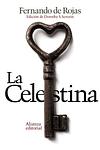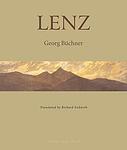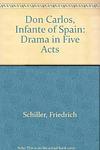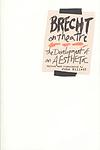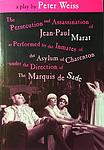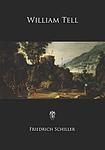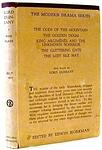The Greatest German, Spanish "Plays" Books of All Time
Click to learn how this list is calculated.
This list represents a comprehensive and trusted collection of the greatest books. Developed through a specialized algorithm, it brings together 305 'best of' book lists to form a definitive guide to the world's most acclaimed books. For those interested in how these books are chosen, additional details can be found on the rankings page.
Genres
Plays are a category of literature that consists of written works intended for performance on stage. They typically feature dialogue between characters and are structured into acts and scenes. Plays can be comedic, tragic, or a combination of both, and often explore themes such as love, power, and morality. They are meant to be performed by actors in front of an audience, and can be enjoyed both as written works and as live performances.
Countries
Date Range
Reading Statistics
Click the button below to see how many of these books you've read!
Download
If you're interested in downloading this list as a CSV file for use in a spreadsheet application, you can easily do so by clicking the button below. Please note that to ensure a manageable file size and faster download, the CSV will include details for only the first 500 books.
Download-
1. Faust by Johann Wolfgang von Goethe
The book is a tragic play in two parts that tells the story of a scholarly man named Faust, who becomes dissatisfied with his life and makes a pact with the devil, Mephistopheles. In exchange for unlimited knowledge and worldly pleasures, Faust agrees to give his soul to Mephistopheles after death. The narrative explores themes of ambition, despair, love, and redemption, ultimately leading to Faust's salvation.
The 84th Greatest Book of All Time -
2. La Celestina by Fernando de Rojas
The book is a tragic comedy set in 15th-century Spain, revolving around the passionate and ill-fated love affair between Calisto and Melibea. After Calisto falls for Melibea but is rejected, he enlists the help of Celestina, an old and cunning procuress, to win Melibea's heart. Celestina's manipulations initially seem successful, but her greed and the involvement of various other servants and hangers-on lead to a series of dramatic and violent events. The story ultimately unfolds into a cautionary tale of lust, deception, and the destructive consequences of obsessive love, ending in tragedy for most of the main characters.
The 649th Greatest Book of All Time -
3. Life Is a Dream by Pedro Calderón de la Barca
"Life is a Dream" is a philosophical allegory regarding the human situation and the mystery of life. The play follows the story of Segismundo, Prince of Poland, who has been imprisoned in a tower by his father, King Basilio, following a dire prophecy that the prince would bring disaster to the country and death to the King. Basilio briefly frees Segismundo but returns him to the tower when the prince proves violent and unruly. The story explores themes of free will, fate, power and the thin line that separates reality from dreams.
The 1186th Greatest Book of All Time -
4. Mother Courage and Her Children by Bertolt Brecht
Set against the backdrop of the Thirty Years' War, the book tells the story of a canteen woman, Mother Courage, who pulls her cart with her three children across war-torn Europe. It explores her struggles and survival tactics as she tries to profit from the war while keeping her children safe. The narrative is a profound critique of war and its consequences, highlighting the human cost of conflict and the often futile search for prosperity and security in a chaotic world.
The 1721st Greatest Book of All Time -
5. The Resistible Rise of Arturo Ui by Bertolt Brecht
"The Resistible Rise of Arturo Ui" is a satirical play that uses the rise of a fictional 1930s Chicago mobster, Arturo Ui, to parallel the rise of Adolf Hitler in Nazi Germany. The narrative is a critique of those who allowed Hitler to come to power, emphasizing that his rise was indeed resistible. The play explores themes of power, corruption, manipulation, and the dangers of complacency, showcasing the destructive potential of unchecked ambition and the failure of society to prevent the ascent of dangerous individuals.
The 1725th Greatest Book of All Time -
6. Galileo by Bertolt Brecht
This play delves into the life of the renowned Italian scientist, Galileo Galilei, who challenged the church's belief in a geocentric universe. It explores his struggles against the Catholic Church, his recantation, and the consequences of his actions on his life and those around him. The narrative also examines the conflict between science and religion, the ethics of scientific discovery, and the price of truth.
The 1877th Greatest Book of All Time -
7. Bohemian Lights by Ramón del Valle-Inclán
"Bohemian Lights" is a novel set in early 20th century Madrid, Spain, featuring a group of bohemian artists and intellectuals as they navigate poverty, passion, and the pursuit of their crafts. The narrative captures their struggles and triumphs, the vibrant and decadent world they inhabit, and their unyielding commitment to their artistic ideals. The novel offers a vivid portrayal of bohemian life, with its blend of joy, despair, and relentless creative energy.
The 2605th Greatest Book of All Time -
8. Spring Awakening by Frank Wedekind
The book is a provocative and controversial play that delves into the tumultuous emotional landscape of adolescence. Set in late 19th-century Germany, it follows a group of teenagers as they navigate the complexities of sexuality, authority, and rebellion. The narrative exposes the repressive and hypocritical nature of the society that stifles the natural desires and questions of the young characters, leading to tragic consequences. Through its candid exploration of themes such as sexual awakening, suicide, abortion, and the critique of the educational system, the play challenges the audience to confront the damaging effects of ignorance and the urgent need for open communication and understanding between generations.
The 2707th Greatest Book of All Time -
9. The Caucasian Chalk Circle by Bertolt Brecht
The play is a parable set in the Soviet Union that explores themes of justice, class struggle, and morality through the story of Grusha, a servant girl who risks her life to protect an abandoned child of noble birth during a time of revolution. As the child grows, a dispute over his custody arises, leading to a trial presided over by a wily, unconventional judge named Azdak. The trial's resolution hinges on the titular chalk circle test, which ultimately reveals the true nature of parental love and the importance of putting the needs of the child first. The narrative is a commentary on the social and political issues of the time, advocating for a society that prioritizes the welfare of its most vulnerable members.
The 2778th Greatest Book of All Time -
10. The Trickster of Seville and His Guest of Stone by Tirso de Molina
"The Trickster of Seville and His Guest of Stone" is a classic Spanish play that tells the story of a libertine nobleman who seduces women and leaves them, refusing to marry. His actions lead to severe consequences when he invites a statue of a man he has wronged to dinner. The statue, representing divine justice, accepts the invitation and later reciprocates, leading to the protagonist's downfall. The play is widely recognized for introducing the legendary character of the seductive rogue to the world of literature.
The 2935th Greatest Book of All Time -
11. The Good Person of Szechwan by Bertolt Brecht
"The Good Person of Szechwan" is a parable play that explores the difficulty of maintaining one's morals and goodness in a corrupt and exploitative world. The story revolves around a kind-hearted prostitute who struggles to be a good person under the harsh realities of life in Szechwan. When three gods visit the city in search of a good person, they find only her willing to help them. However, to survive, she must adopt a ruthless alter ego, leading to a complex exploration of morality, identity, and societal pressures.
The 3392nd Greatest Book of All Time -
12. Lenz by Georg Buchner
"Lenz" is a novella that explores the mind of Jakob Michael Reinhold Lenz, a historical figure and playwright, during his descent into madness. The narrative presents a detailed account of Lenz's mental state as he struggles with depression, anxiety, and hallucinations while living in the mountains. It provides a profound look into the human psyche and the effects of isolation and mental illness.
The 3791st Greatest Book of All Time -
13. Don Carlos: Infante of Spain, a Drama in Five Acts by Friedrich Schiller
"Don Carlos: Infante of Spain, a Drama in Five Acts" is a historical play that portrays the intense political and personal conflicts within the Spanish royal court. The story revolves around Don Carlos, the son of King Philip II of Spain, who is in love with his stepmother, Queen Elisabeth of Valois. The narrative also introduces Marquis Posa, a nobleman who advocates for freedom, and becomes a confidant to both Don Carlos and the King. The play explores themes of love, power, freedom, and betrayal, culminating in a tragic ending.
The 4484th Greatest Book of All Time -
14. Nathan the Wise by Gotthold Ephraim Lessing
"Nathan the Wise" is a 18th-century play that explores religious tolerance and interfaith understanding. The story is set in Jerusalem during the Third Crusade and revolves around Nathan, a wealthy Jewish merchant, who is renowned for his wisdom and generosity. The narrative explores themes of religious tolerance as Nathan interacts with a Templar knight, a Christian patriarch, and the Muslim sultan Saladin. The story culminates with the revelation that the main characters, despite their different faiths, are all part of the same family, thus promoting a message of shared humanity and religious coexistence.
The 4483rd Greatest Book of All Time -
15. Brecht On Theatre by Bertolt Brecht
"Brecht on Theatre" is a seminal work that compiles various essays, notes, and journal entries that delve into the theories and practices of influential German playwright and director Bertolt Brecht. The book explores Brecht's development of Epic Theatre, a style intended to provoke rational self-reflection and a critical view of the action on the stage, rather than emotional manipulation. Brecht's ideas emphasize the importance of the audience's engagement through a variety of innovative dramatic techniques, including the alienation effect, which aims to prevent the audience from losing itself passively and completely in the character's emotions. This collection serves as an essential guide for understanding the evolution of modern theatre and Brecht's enduring influence on dramaturgy and performance.
The 5517th Greatest Book of All Time -
16. Marat Sade by Peter Weiss
The play is a dramatic exploration of power, class struggle, and human suffering set within the confines of an insane asylum in 1808 France. It depicts the Marquis de Sade as an inmate directing his fellow patients in a play about the assassination of Jean-Paul Marat, a radical journalist and politician during the French Revolution. The work delves into the philosophical and political debates between Sade and Marat, representing differing views on revolution, freedom, and the nature of humanity. As the inmates perform, the line between performance and reality blurs, creating a provocative and chaotic theater experience that challenges the audience's perception of madness and reason.
The 6119th Greatest Book of All Time -
17. William Tell by Friedrich Schiller
The play centers around the legendary Swiss hero, William Tell, who defies the oppressive Austrian authority represented by the tyrannical bailiff, Gessler. Set in the early 14th century, it explores themes of tyranny, freedom, and justice. Tell is driven to rebellion after being forced to shoot an apple off his son's head as punishment for not bowing to Gessler's hat, a symbol of Austrian control. His successful defiance becomes a rallying point for a Swiss uprising against Austrian rule, culminating in the struggle for and achievement of Swiss independence. The play highlights the moral righteousness of fighting for freedom and the importance of individual and collective resistance against tyranny.
The 6745th Greatest Book of All Time -
18. Fuente Ovejuna by Lope de Vega
"Fuente Ovejuna" is a Spanish Golden Age play that centers around the collective uprising of the inhabitants of a small village against their oppressive overlord. After enduring countless abuses, the villagers, led by a young woman named Laurencia, band together to revolt and ultimately murder the tyrannical commander. When royal authorities arrive to investigate, the villagers respond with a united front, famously declaring "Fuente Ovejuna did it," showcasing the power of communal solidarity against injustice. The play explores themes of rebellion, honor, and the strength of the collective will, and is celebrated for its portrayal of the human spirit's resistance to tyranny.
The 6953rd Greatest Book of All Time -
19. Mary Stuart by Friedrich Schiller
The play delves into the tragic life of the titular character, a former queen who finds herself imprisoned and facing execution at the hands of her cousin, the reigning monarch of England. It explores themes of power, betrayal, and the struggle for sovereignty, as the protagonist confronts her impending fate with dignity and courage. The narrative unfolds through a series of intense encounters with various historical figures, each revealing the complex web of political intrigue and personal vendettas that sealed her doom. The play ultimately serves as a poignant examination of the human cost of political rivalry and the inexorable march of history.
The 6962nd Greatest Book of All Time -
20. Egmont by Johann Wolfgang von Goethe
"Egmont" is a tragic play set in the 16th-century Spanish-occupied Netherlands, focusing on the life of a nobleman who becomes a hero among the Dutch people for his resistance against the oppressive Spanish rule. The protagonist's political and romantic involvements lead him into conflict with the Spanish authorities, culminating in his arrest and execution. Despite his tragic end, his sacrifice becomes a symbol of national resistance and inspires a successful uprising against the foreign dominators. The play explores themes of freedom, tyranny, and the personal costs of political engagement, blending historical drama with romantic elements.
The 7168th Greatest Book of All Time -
21. Verse Plays by Johann Wolfgang von Goethe
The book is a collection of dramatic works written in verse by the renowned German literary figure. These plays showcase the author's versatility and mastery in blending classical and romantic elements within the theatrical form. The content ranges from explorations of mythological themes to humanistic inquiries, all unified by the author's poetic language and philosophical depth. The plays within this compilation are celebrated for their lyrical beauty and intellectual rigor, reflecting the author's profound understanding of the human condition and his ability to translate complex ideas into compelling dramatic narratives.
The 7168th Greatest Book of All Time -
22. The Robbers by Friedrich Schiller
"The Robbers" is a dramatic tale of conflict between two aristocratic brothers, Karl and Franz Moor. Karl, the elder, is deeply idealistic but becomes an outlaw after being falsely led to believe he has lost his father's love and his inheritance due to his brother's machinations. Meanwhile, Franz, the younger brother, is a scheming villain who manipulates their father and seeks to consolidate power and wealth for himself. The play explores themes of justice, family loyalty, and the nature of good and evil as Karl leads a band of rebels against the societal corruption he despises, only to find that his quest for justice is fraught with moral ambiguity and personal tragedy.
The 7168th Greatest Book of All Time -
23. Wallenstein by Friedrich Schiller
The book is a dramatic trilogy that delves into the complex life and times of a prominent figure during the Thirty Years' War, a European conflict that spanned from 1618 to 1648. It explores the rise and fall of the titular character, a powerful and ambitious general who commands the Imperial forces of the Holy Roman Emperor. The narrative examines themes of power, loyalty, and betrayal as the general navigates the treacherous political landscape, ultimately facing a tragic downfall due to his overreaching ambition and the machinations of his enemies. The work is a rich tapestry of historical drama and personal conflict, reflecting on the nature of authority and the consequences of hubris.
The 7168th Greatest Book of All Time -
24. Five Plays by Heinrich von Kleist
"Five Plays" is a collection of dramatic works by a renowned German playwright, showcasing a range of themes from personal tragedy to political satire. The plays within this anthology are known for their intense emotionality, complex characters, and exploration of moral and philosophical dilemmas. The playwright's unique style combines classical forms with a sense of modernity, often leading to abrupt and surprising plot twists. The plays challenge conventional morality and social norms, reflecting the author's preoccupation with the conflicts between individual desires and societal expectations, as well as the often tragic consequences of these tensions.
The 7168th Greatest Book of All Time -
25. Danton's Death by Georg Buchner
The play is a historical drama that delves into the tumultuous period of the French Revolution, focusing on the conflict between two revolutionary leaders. It portrays the downfall of the titular character, a once-influential figure in the revolution who finds himself at odds with the extremist factions that have risen to power. As he grapples with his eroding influence and the shifting political landscape, the protagonist is ultimately arrested, tried, and faces the guillotine. The narrative explores themes of power, idealism, corruption, and the tragic consequences of revolutionary fervor, offering a poignant commentary on the nature of political upheaval and the fate of those who find themselves on the losing side of history.
The 7168th Greatest Book of All Time
Reading Statistics
Click the button below to see how many of these books you've read!
Download
If you're interested in downloading this list as a CSV file for use in a spreadsheet application, you can easily do so by clicking the button below. Please note that to ensure a manageable file size and faster download, the CSV will include details for only the first 500 books.
Download
